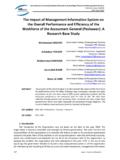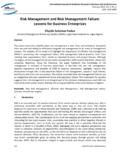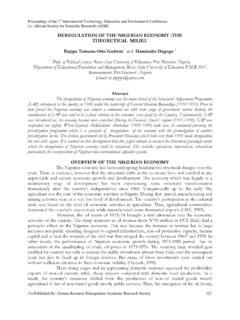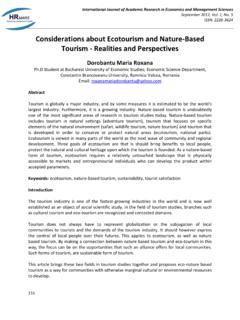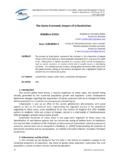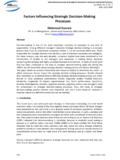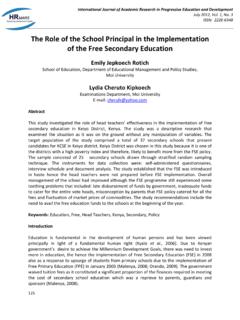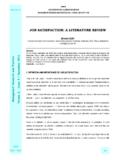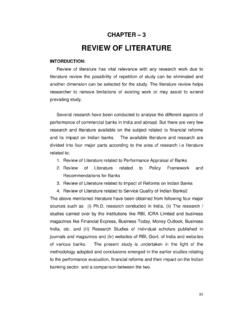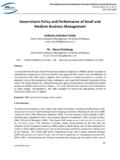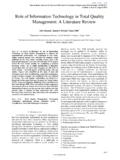Transcription of The Relationship between McGregor's X-Y Theory …
1 International Journal of Academic Research in Business and Social Sciences May 2013, Vol. 3, No. 5 ISSN: 2222-6990 715 The Relationship between McGregor's X-Y Theory Management Style and Fulfillment of Psychological Contract: A Literature Review. Ramesh Kumar Moona Haji Mohamed PhD candidate, School of Distance Education, Universiti Sains Malaysia, Penang, Malaysia Email: Dr Che Supian Mohamad Nor School of Distance Education, Universiti Sains Malaysia, Penang, Malaysia Email: Abstract The purpose of this paper is to trace mcgregor s X-Y Theory and its Relationship with fulfillment of psychological contract. This is a review article relying on literature reviews and synthesizing concepts and ideas from related sources. mcgregor s X-Y Theory is a natural rule for managing people.
2 mcgregor s ideas suggest that there are two fundamental approaches to managing people. Theory X management style generally get poor results compare with managers use Theory Y, which produces better performance and results, and allows people to grow and develop. This paper argues that Theory Y managers are the effective leaders who could fulfill the psychological contract of employees. Therefore, psychological contract fulfillment is closely related to Theory Y management s style. Furthermore a modern idea of management style; the autocratic style of management is closely related to traditional mcgregor s Theory X and the democratic is related to Theory Y management style. This area of study is suggested for future research.
3 Keywords: Theory X, Theory Y, Management Style, Psychological Contract, Psychological Contract fulfillment. Introduction Generally, the study of Psychological interaction between the management of an organization and the subordinate employees are very wide. Before considering distribution of works, an organization must decide from the outset how to deal with employees. In order to lead to improved performance for the company and possibly to improved employee relations, a strong understanding of the Relationship should be practiced. Thus, numerous theories have been designed related to the psychological interaction between the management of an organization and the subordinate employees.
4 Theory X and Y which deals with the motivational factors that influence employee behavior was one of the theories. Since Theory X and Y dealing with a complete system of interaction, similar to how a physical model simulates the behavior of a International Journal of Academic Research in Business and Social Sciences May 2013, Vol. 3, No. 5 ISSN: 2222-6990 716 physical system, Theory X and Y considered as models . Douglas mcgregor is the one who constructed Theory X and Y in the 1960s. Theory X and Y created by mcgregor has been a valid basic principle from which to develop positive management style and techniques. McGregor's ideas suggest that there are two fundamental approaches to managing people.
5 Several managers influenced by Theory x, and generally get poor results. On the other hand, liberal managers use Theory y, which produces better performance and results, and allows people to grow and develop. Moreover, mcgregor s concept relatively relate to modern understanding of the Psychological Contract, which provides several ways to appreciate the unhelpful nature of X- Theory leadership, and the useful constructive beneficial nature of Y- Theory leadership. The aim of this research is to review and synthesizing concepts and ideas from related sources relying on literature reviews to argue that there is a Relationship between Theory X, Theory Y management style with fulfillment of Psychological Contract.
6 Literature review Theory X and Theory Y was an idea devised by Douglas mcgregor in his book The Human Side of Enterprise 1960. It encapsulated a fundamental distinction between management styles and has formed the basis for much subsequent writing on the subject. Theory X In the first few decades of the 20th century Theory X is the style that predominated in business after the mechanistic system of scientific management had swept everything away. Theory X is an authoritarian style where the emphasis is on productivity, on the concept of a fair day's work, on the evils of feather-bedding and restriction of output, on rewards for performance (Tim Hindle 2003). Latterly Theory X has been considered as a negative way of dealing with employees.
7 In this Theory its assume that employees are, by nature, reluctant to fulfill the obligations of their job and instead will find ways to avoid work or otherwise reduce their work output in a bid to expend the least amount of effort possible. When there is more motivated management staff and owners urge the employees into making them work, the company will be successful and have productive employees as conceived by Theory X. In order to detect attempts by the staff to avoid work it is demanded a strict control and monitoring of behavior. The authority must keep a careful eye out for sabotaging effects by self-interested employees and find the cause of disruptions, handing out penalties in the belief that a sincere wish to avoid responsibility is the root cause for the majority of trouble.
8 Theory Y Theory Y is a participative style of management which assumes that people will exercise self-direction and self-control in the achievement of organizational objectives to the degree that they are committed to those objectives . It is management's main task in such a system to International Journal of Academic Research in Business and Social Sciences May 2013, Vol. 3, No. 5 ISSN: 2222-6990 717 maximize that commitment (Tim Hindle 2003). In many ways, Theory Y is, the diverse to that of Theory X. Rather than taking the view that employees must be forced to do what management want and that they will not, under any circumstances, do anything beneficial for the company under their own direction, Theory Y states that employees actually become more productive when more trust and responsibility is delegated to them.
9 According to Theory Y, employees do wish to work and be productive and the act of doing well at work is itself a strong motivator. Moreover if the employee s will seek responsibility and ways to be productive, if they are allowed to do so. Regarding to Charles M. Carson, (2005), mcgregor Theory Y stands in a unique place in management history and advocated a heightened awareness of management's responsibility for the human side of employer-employee relations. In a nutshell, according to mcgregor : Man is a wanting animal and as soon as one of his needs is satisfied, another appears in its place. mcgregor urged companies to adopt Theory Y. Only it, he believed, could motivate human beings to the highest levels of achievement.
10 Theory X merely satisfied their lower-level physical needs and could not hope to be as productive. Psychological Contract Fulfillment The employment Relationship has undergone a number of significant changes in recent years. In large part, this transformation has been brought about by the increasing globalization of business, by the dramatic rise in the number of mergers, restructurings, and layoffs, and by the increasing rate of change that permeates all of organizational life today (Kissler, 1994; McLean Parks & Kidder, 1994). As a result of these events, psychological contracts have become increasingly important in helping to define the contemporary employment Relationship . Psychological contracts consist of the beliefs employees hold regarding the terms and conditions of the exchange agreement between themselves and their organizations (Robinson, Kraatz & Rousseau, 1994; Rousseau, 1989).
